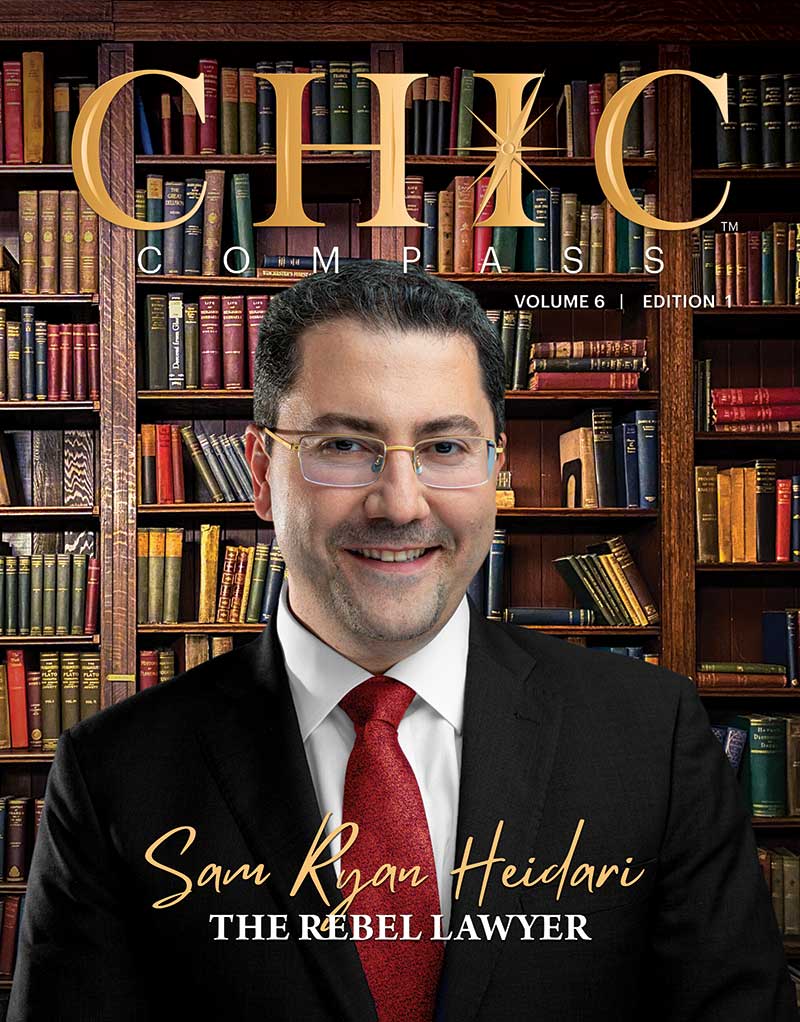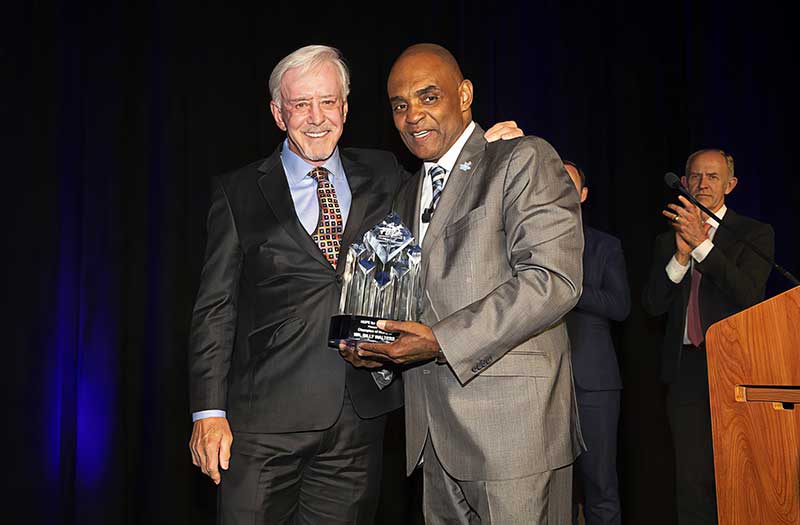
Billy Walters of the Walters Family Foundation congratulates Founder and CEO Jon Ponder of Hope for Prisoners.
Hope for Prisoners
As People Leave the Penal System, Lives are Reclaimed
BY DEBBIE HALL / PHOTOGRAPHY COURTESY OF HOPE FOR PRISONERS
Prisoners are human beings with people who love and care about them and, at one time, maybe had goals and dreams. Founder and CEO of Hope for Prisoners, Jon D. Ponder, understands this from a very personal perspective, creating an organization assisting with re-entry by providing the formerly incarcerated long-term support and services. Through this organization, people released from prison work to reclaim their lives, families, and standing in the community. Hope changes lives.
The need for such an organization is apparent with the re-offending rate in Nevada, with one in three people previously sentenced returning to prison convicted of a new offense. Hope for Prisoners offers a significant success rate, with only a 6 percent recidivism rate of those who graduate from the 18-month program.
Other statistics demonstrate the impact of Hope for Prisoners. At the end of 2023, according to Statista, the United States ranks sixth with the largest population of prisoners, and the state of Nevada ranks 30th. In Southern Nevada, it costs over $100,000 annually to house a prisoner in jail, and $23,000 is allocated annually for each prisoner’s care in the state penal system.
“Our organization works with men, women, and young adults exiting different arenas of the judicial system, providing the support of services to help them to reintegrate back into their home, workplace successfully, and ultimately back into our community,” explains Ponder.
Ponder found himself returning to his community after spending time in prison and experienced firsthand the same challenges most face when they are released. He had been in and out of the judicial system since he was 12 years old in juvenile detention and multiple jails and prisons in the state of New York. He was then sentenced to serve time in a maximum U.S. federal penitentiary in Nevada.
“It was there that my life took a turn for the better. I was standing in my prison cell and thought about the last 37 years of my life. I realized I left a path of destruction and had not accomplished anything of great significance. As I stood there, it was a faith conversion. I asked God to forgive me, and He did, and I asked Him to turn my life around.”
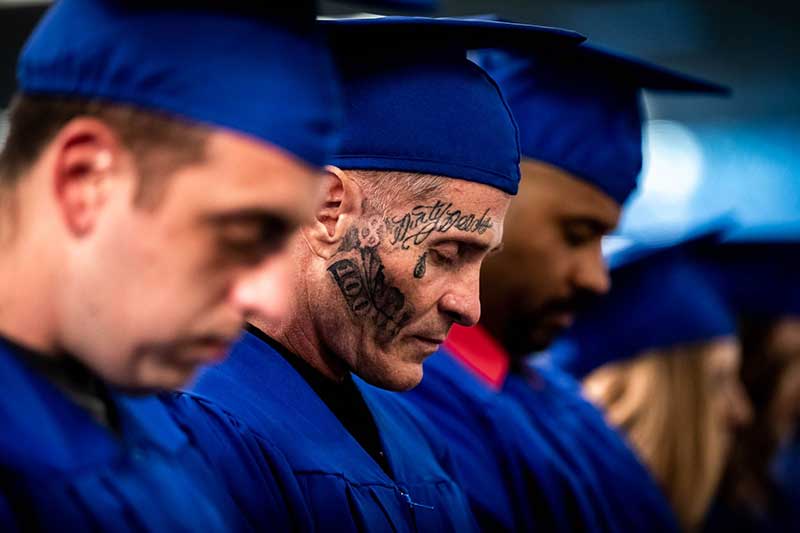
Graduates pray for guidance during the graduation ceremony held by Hope For Prisoners.
This became a 180-degree turn for Ponder, and he would spend his time in prison addressing all the issues and circumstances that led to his path to all those years of incarceration. Ponder also planned on never returning to prison, and he was ready to get back to the business of life.
During this very personal process, Ponder understood so much about his life that he wanted to help others in the same situation who would face the same challenges when released. He realized there was a lack of long-term support and guidance for those who learned from their mistakes and genuinely wanted to change the direction of their lives.
“I wanted to remove the barriers preventing them from becoming successful in life and help escort them to the next level of life,” he says.
Ponder was released in 2009, with Hope for Prisoners becoming operational in 2010. “We have had the great privilege of working with over 5,500 clients with one of the highest success rates of helping people not to re-offend and live a level of life that many dream about. Our aim is to change the face of re-entry for people who have paid their debt to society, are back in our community, and deserve a second chance.”
Learning technology is essential since the digital age is integral to everyday life, from applying for a job, banking, paying bills, watching television, ordering food, and communicating with others.
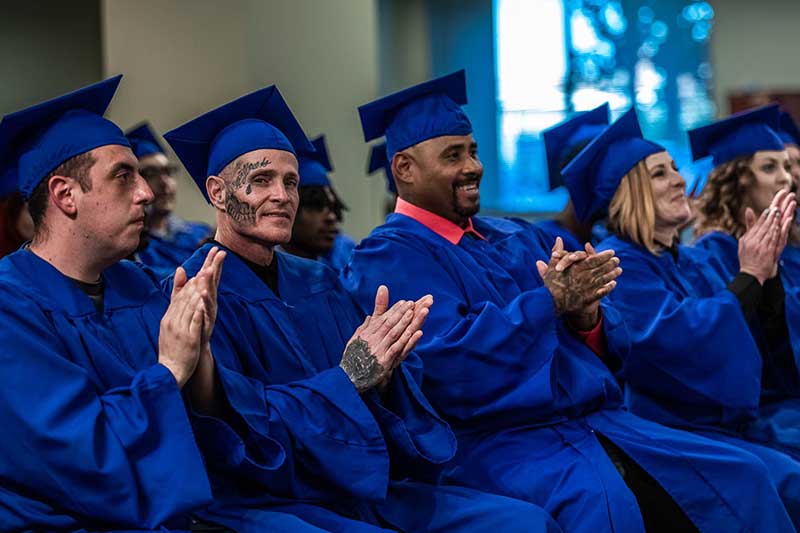
Graduates applaud all of the support for them during the graduation celebration held by Hope For Prisoners.
“We work to expose people to the technological changes of our society; someone being released after serving 10, 15, 25, or 30 years is coming into a brand-new world. Many don’t even know how to operate a cell phone or a computer. We teach them the basics of living in a digital age. Most, if not all, vocations use technology, and people need to know how to operate these devices,” he says.
Hope for Prisoners is grateful to the latitude of the Nevada Department of Corrections, which has permitted them to train those incarcerated about technology, allowing tablets inside the prison system through collaboration with Via Path.
“We are in the middle of something that is going to shine a light on Nevada, which is our pre-release program where we go into the penal system and work with people 18 months prior to their release,” says Ponder. “We believe re-entry begins at day one of incarceration, and we need to spend as much time as possible to prepare people for the day they get released.”
Hope for Prisoners offers an 18-month leadership development program, substance misuse counseling and communication, and educational, parenting, and financial literacy classes. Hope for Prisoners is building a Vocational Village at the Southern Desert Correctional Center, funded in part by The Walters Family Foundation and the Engelstad Foundation, offering training in HVAC, electrical, plumbing, and other vocational careers to be offered six months before release. They are also creating a full-service commercial driving school.
The organization also offers different programs for men and women.
“When we first started in 2010, we would provide the same services to men and women, and many were doing good in the community. Then, all of a sudden, one of our female clients would go off the rails. We decided to do a deep dive and discovered a traumatic event in a woman’s life that they never addressed and tried to ‘stuff’ it down, so on the outside, these women looked like they had it all together. But then something would trigger this trauma. We now help women identify traumas from their past and address them. I am happy to report that we have really increased our success rate with women.”
One of the most significant losses for those who are incarcerated is contact and interaction with their families. When a person is sentenced to a jail or prison term, their families receive the same sentence. There is a strong emphasis on family reunification.
“I believe this has been a missed mark and very broken in our prison system,” states Ponder. “People ignore the men and women coming home and must reconnect with spouses and children. We made certain to have that mechanism in place with reunification because if that part of life is not right, everything else tends to fall apart. Working with men and women before they are released also helps with understanding the family dynamic and what that person can expect when they come home.”
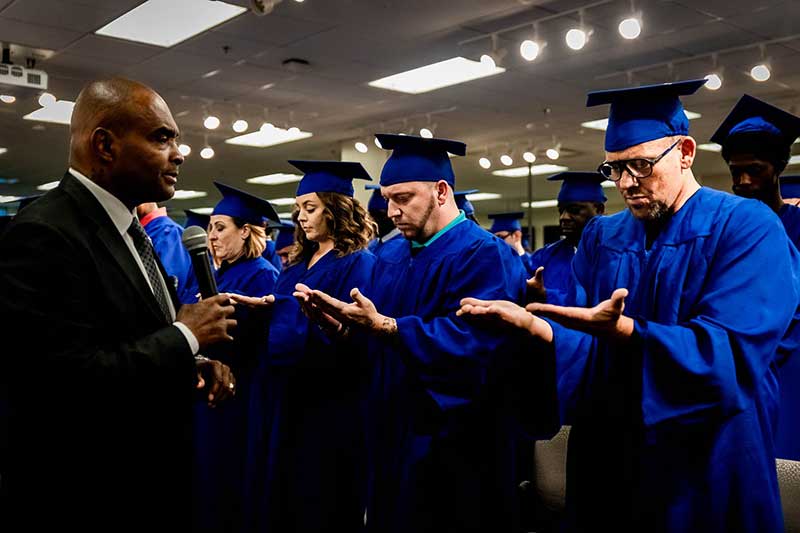
Founder and CEO Jon Ponder speaks to the graduates during the graduation ceremony held Hope For Prisoners.
For example, they worked with a male client who had been the financial support for the family, serving seven years. His wife was at home raising four children, receiving public assistance. Hope for Prisoners helped the mother with resources and sent her to receive vocational training, placing their children into a safe-key program and daycare. Working with the family and the incarcerated person will help reunify when he is released.
Part of the family reunification process is their annual Christmas event. Hope for Prisoners took 101 incarcerated men and women during the past holiday season and transported them to the Opportunity Village Magical Forest. They could sit on couches surrounded by Christmas trees and other holiday décor while sharing a Christmas morning experience with their families. For many of the participants, many had not had personal contact in years.
Hope for Prisoners also holds graduation ceremonies for those who have completed their programs, with speakers from the government and law enforcement.
“The success of our clients is the result of their long-term commitment and relationship with their mentors. What makes Hope for Prisoners different from other organizations is its partnership with local law enforcement. This helps clients to understand the role of law enforcement in the community and help them overcome their fear of police and build respect for law enforcement.”
On a personal note, Ponder was pardoned by President Donald Trump in 2020. The president honored both Ponder and Richard Beasley, the FBI agent who arrested him, in 2018 during a ceremony in the White House Rose Garden during the National Day of Prayer.
“That was one of the most memorable moments of my entire life. It was as if my hard work before being released prepared me to help other men and women. It was one of my life’s most rewarding moments, and I will never forget it. The most remarkable thing about that pardon was the letters I received from other inmates across the nation about how proud they were of my achievements, and it gave them hope. What a big moment for me!”
According to Ponder, 2024 is going to be amazing and a game-changer. “Our men and women trained by Hope for Prisoners will become the economic fuel for the state and the country.”
For more information:
Website:
hopeforprisoners.org
Facebook, Instagram,
and LinkedIn
@HopeForPrisoners
X (formerly Twitter)
@hopeforprisoners1
YouTube
@HopeForPrisonersLasVegas

